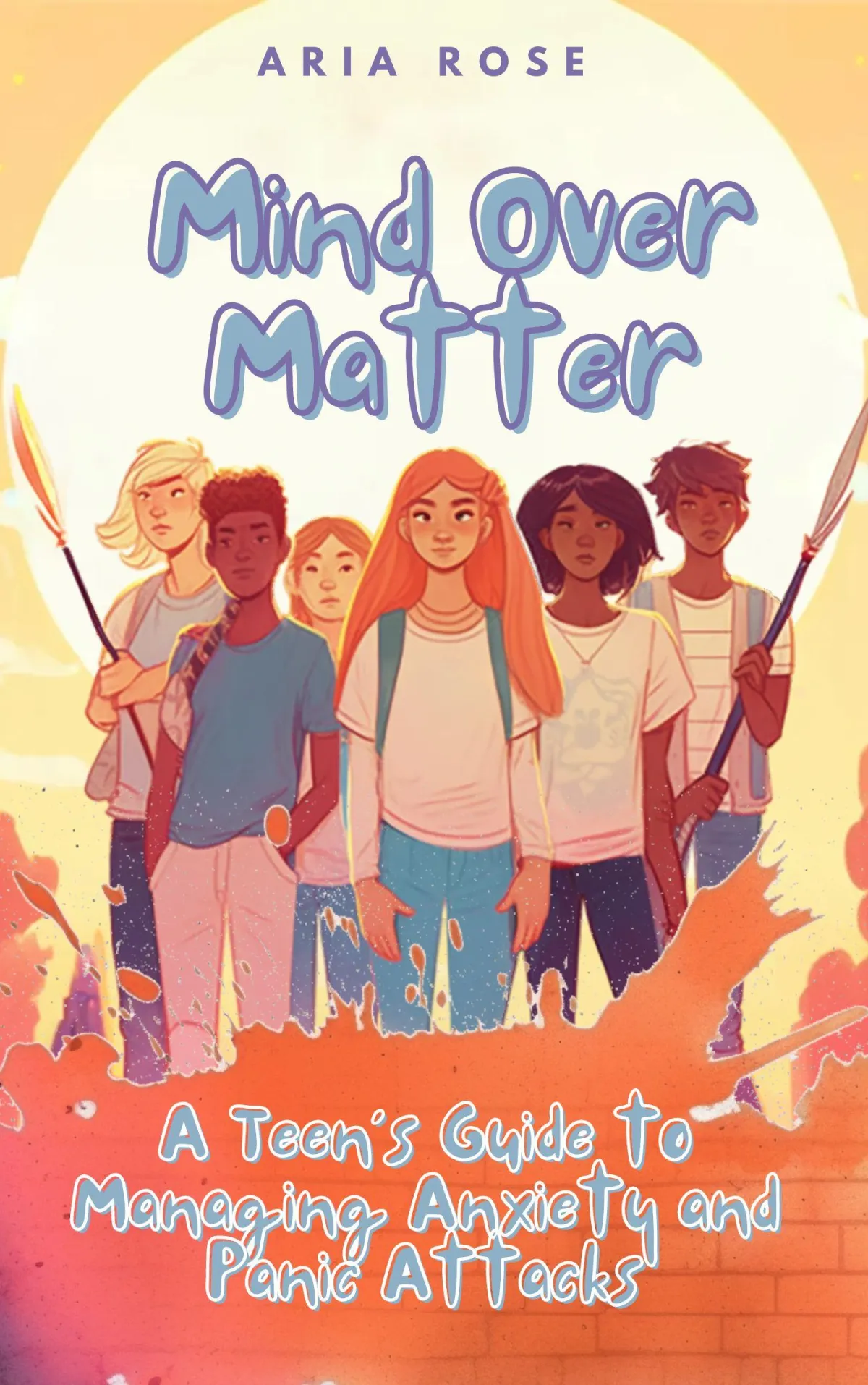Transform Your Mind
with the 'Calm Mind' Newsletter
Join our journey at A Peaceful Tomorrow, where we guide young adults and teenagers to a life of resilience, self-confidence, and mental well-being.
“I LOVE This Newsletter! I'm learning more about myself with each one!

Recent Posts

12 Myths about Teen Depression (You probably still believe the last one until now.)
Content:
Teen depression: How Common is it?
What is it like to have depression?
Why do teens like you have depression?
12 myths about teen depression
Conclusion
Teen depression: How Common is it?
Teen depression is characterized by constantly feeling sad, irritable, or empty for an extended period. It is self-reported that there are 36.7% of 13,677 aged 14‒18 experience sadness and hopelessness, and 18.8% of them are seriously considered attempting suicide according to an article by Bitsko RH, Claussen AH, Lichstein J, et al. (2022) entitled Mental Health Surveillance Among Children — United States 2013–2019. Statistics show teen depression is a serious mental health issue that you should be aware of.
Awareness about teen depression pushes you to acquire the correct information about this concern. However, there are misunderstandings about depression, which makes it harder for teens who suffer from this condition to fight and break free. If it’s not treated, it will lead to severe complications and suicide. Understanding teen depression with accurate knowledge will help you to recognize what it looks like and how you respond to people who have this condition. This article discusses the common misconceptions of teen depression. But before that, let’s talk first about its symptoms and causes.
What is it like to have depression?
Teenagers like you may experience ups and downs. Being sad and moody is a normal part of our life, especially when we are in puberty. However, when this sadness and moodiness last long and affect everyday performance in school and work, even in your relationships or hobbies, you may have depression. Here is the list of what it looks like to have depression:
Feelings of sadness and frequent crying
extreme irritability and frustration
Loss of interest in activities.
Low self-esteem
Excessive usage of Smartphones and Internet
aggressive and violent
insomnia
Eating problems
Problems at school like absences, failing grades, and difficulty to focus
Having trouble socializing
Feelings of worthlessness or guilt
Suicidal thoughts and self-harm
exaggerated self-blame
Feeling hopeless
Extreme sensitivity to rejection
hard to make decisions
have trouble remembering information
stomach aches, nausea or headache
Although this list is a proven symptom of depression, it’s better to consult your primary health care doctor or a mental health specialist. If you are experiencing suicidal thoughts, contact your local suicide hotline or call a mental health professional. Always reach out and ask for help.
Why do you have depression?
Many factors increase the risk of having depression. These include:
Traumatic life event
There are life events that can lead to depression. You may feel frightened and unsafe after you experience traumatic events. These are the other traumatic situations that may lead to depression, according to the article What Is Situational Depression? by Kara Mayer Robinson (2023):
Divorce
Experiencing a crime
Family problems
Global pandemic like COVID-19
Having a baby
Illness or difficult diagnosis
Loss of a family member, friend, or pet
Loss of a job
Moving
Natural disaster
Relationship problems
Retirement
School-related issues
Starting a new job
Work-related issues
Brain Chemistry
Your brain has neurotransmitters, which carry signals (messages) to other parts of your brain and body. These chemicals regulate your brain activity and control body functions like memory and feelings, stress response, sleep, hormone regulation, and senses. Imbalances and depletion of these neurotransmitters in your brain will cause changes in your mood, leading to depression.
Bullying
There is a greater risk of developing depression if you experience physical, verbal, and cyberbullying. Violence and mistreatment cause you to have low self-esteem, be unmotivated, and feel worthless, which are signs of depression.
Mental and physical health problems
Dealing with other mental health conditions like anxiety can trigger depression. Managing your physical illness can affect your mood. Ongoing treatments, therapy, and medications, even the pain from injections, make you feel fatigued and, sometimes, loss of motivation to live longer. Stress builds up when you realize your typical day-to-day tasks and activities are not the same anymore.
Family Issues
Conflicts within the family can create a hostile environment for you, which contributes to stress and depression. It could be a feud with your sibling or your parent. Parenting styles and domestic conflict can shape your mental well-being.
Peer and school pressure
You may have difficulty managing your responsibilities in school and fitting in with your peers. Negative peer pressure can influence you to bully others, use alcohol and drugs, and have a poor perception of physical appearance, which is harmful to you and generates long-term adverse effects on your health and relationships.
12 myths about teen depression
Let’s break down the 12 myths about teen depression:
Teen depression is just moodiness: Teen depression often gets dismissed as normal mood swings. However, it’s more intense and persistent than everyday mood changes. You might exhibit prolonged periods of deep sadness, irritability, or disinterest in activities they once enjoyed. It can affect your daily activities like sleeping and eating. It also harms your school performance.
It’s just a phase: While it’s normal for you to experience emotional ups and downs, clinical depression is more severe and long-lasting. If the symptoms persist for seven to nine months, it could indicate teen depression. Depression without undergoing treatment can increase the chance of having unhealthy behavior and missing out on opportunities.
Teen depression is the same as adult depression: You might display different symptoms compared to adults. You might show irritability or aggression. Adults, on the other hand, might exhibit feelings of sadness and are socially detached.
You’re just attention-seeking: Seeking attention doesn’t equate to faking depression. You may seek validation and reassurance. You might act jealous of your siblings or classmates. These behaviors are your ways to comfort yourself from depression. Sometimes, a person’s actions express their emotional pain and need for help.
Depression always stems from trauma: While traumatic events can lead to depression, various factors can trigger depression, such as genetics, family history, chemical imbalances, and social environment.
It’s just about feeling sad: You might not necessarily look sad. Some of you experience emptiness, lack of energy, or display anger or frustration instead of sadness. Forgetfulness and lack of concentration are also shown if you have depression.
You will grow out of it: Depression can worsen if left untreated. Seeking help and support is essential to manage and recover from depression effectively.
Depression only affects girls: Both genders can experience depression, but boys might not express their feelings in the same way as girls. Boys might be more prone to anger or acting out instead of showing sadness. Some boys might avoid getting treatment because others might perceive that he is weak, and this affects their masculinity.
Depression is just in the mind: Depression involves complex interactions between biological, psychological, and environmental factors. It’s not merely a state of mind and can have significant physical symptoms as well. You only see it as a mental concern. It can also affect our body since it is connected to our minds. If you are mentally and emotionally distressed, you will also feel physically sick.
Talking about it worsens it: Open communication and seeking support are crucial for recovery. Talking about depression can help break the isolation and create a supportive environment for those struggling. It is more harmful to stay silent with your thoughts than to open them up with a supportive and reliable person.
Teen depression is just hormonal: While hormones can influence mood, depression is more complex, involving genetic and environmental elements in addition to hormonal changes.
Teen depression is untreatable: Depression is among the mental disorders that can be treated. With the proper support, including therapy, medication, and lifestyle changes, most teens with depression can recover and manage their symptoms effectively. However, episodes of depression may return for some people, but having a treatment plan can lower the chances of episodes appearing.
Conclusion
Do you still believe these myths about teen depression? Misconceptions influence people's beliefs and thinking about depression. These can intensify the stigma of this concern and the teens living with depression. Having the correct information about teen depression is essential to fight and respond to this issue. We can build a strong support system if we have the correct thinking. It will lead us to see depression on the bright side, that it is happening in real life, and there's hope for people coping with it to get treated and live better. Learn about mental health so you can raise awareness and help yourself and other people heal from mental disorders.
References:
Bitsko, R. H., Claussen, A. H., Lichstein, J., Black, L. I., Jones, S. E., Danielson, M. L., ... Ghandour, R. M. (2022, February 25). Mental Health Surveillance Among Children — United States, 2013–2019. MMWR. Morbidity and Mortality Weekly Report. https://www.cdc.gov/mmwr/volumes/71/su/su7102a1.htm?s_cid=su7102a1_w
Mayer Robinson, K. (2023, July 19). What Is Situational Depression? WebMD. https://www.webmd.com/depression/situational-depression

Subscribe to 'Calm Mind' Newsletter
Join our journey at A Peaceful Tomorrow, where we guide young adults and teenagers to a life of resilience, self-confidence, and mental well-being.
Books
Teen Anxiety
How to manage teen anxiety, even if it feels like an impossible task?
In "A Teen's Guide To Managing Anxiety And Panic Attacks ," Aria Rose takes readers on an insightful journey into the complex world of teenage anxiety. This thought-provoking book is designed to empower young people, equipping them with the knowledge and tools they need to face their fears and transform their lives.With the increasing pressures and challenges of modern adolescence, anxiety has become an
all-too-common reality
for many teens. In this guide, Rose delves into the root causes of teen anxiety, helping readers understand its many facets and the impact it can have on their lives. By providing actionable strategies and practical advice, "Mind Over Matter" serves as a lifeline for teens struggling to cope with anxiety and find their path to emotional well-being.

Key points
The Proven Strategies for Lasting Anxiety Relief
Decode Anxiety Foods
The Anxiety Triggers Unveiled
Coloring Books

Dive into a world of charming and delightful patterns with our coloring books.
Designed to captivate kids and adults of all ages, these books offer a seamless blend of simplicity and joy, ensuring a stress-free coloring experience.
Embrace our collections filled with themes of unique simple bold and easy drawings, tailored not only for children but also for adults who cherish vibrant and straightforward designs.

MORE ABOUT US
A Peaceful Tomorrow
Welcome to A Peaceful Tomorrow, a sanctuary dedicated to providing support, guidance, and resources for anyone grappling with anxiety and other mental health related issues. Our mission is to empower all minds to overcome their mental health challenges and cultivate resilience, self-confidence, and mental well-being.
At A Peaceful Tomorrow, we understand that some emotions can be a complex and overwhelming experiences. Our team of experienced professionals, along with individuals who have triumphed over their own mental health, are passionate about offering practical, evidence-based, and relatable content that addresses the unique needs of today's teenagers.
Our platform offers a comprehensive range of resources, including:
Books: We publish innovative and engaging titles that provide actionable advice, proven techniques, and inspiring stories to help teenagers navigate the complexities of anxiety.
Workshops and Webinars: Our interactive workshops and webinars are designed to equip teenagers with essential tools, strategies, and coping mechanisms to manage anxiety and stress in their daily lives.
Community: A Peaceful Tomorrow fosters a supportive and inclusive community where teenagers can share their experiences, connect with others who understand their challenges, and learn from one another.







